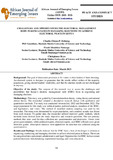| dc.description.abstract | Background:The goal of democratic processes is for voters to elect leaders of their choosing. An electoral system is designed to guarantee that the results reflect wishes of the majority population, giving elected leaders’ credibility, and that the election results are not challenged in anyway. Objective of the study:The purpose of this research was to assess thechallenges and possibilities that Kenya’s electoral management body (IEBC) faces in organizing and managing elections. Methodology:This study was guided by Consociationalism theory, voting theory and rational choice theory. The researcher adopted a descriptive research design with qualitative and quantitative methods. The study was conducted between July 2022 and December 2022. The target population for this study was political parties, political analysts, members of the IEBC, and legislatures, and voters. The method of stratified random sampling was used by the researcher. The strata were determined by target population, and a random sample was drawn from each stratum. To gather data, the researcher utilized interview guide methods, which included items derived from the study objectives and research questions. The two primary methods that were used for data collection are: questionnaires and interviews. Voters were given questionnaires, while politicalexperts, electoral experts, and IEBC officials were given interview guides. Descriptive statistics were applied for the data that was collected using the questionnaires.Results and Findings:Results indicate that the IEBC faces a host of challenges in relation to organizing, conducting and managing elections to achieve electoral peace in Kenya. These can be categorized into operational, administrative and legal.Opportunities for IEBC includeextant judicial decisions; benchmarking; experiential learning; and voter education. | en_US |

